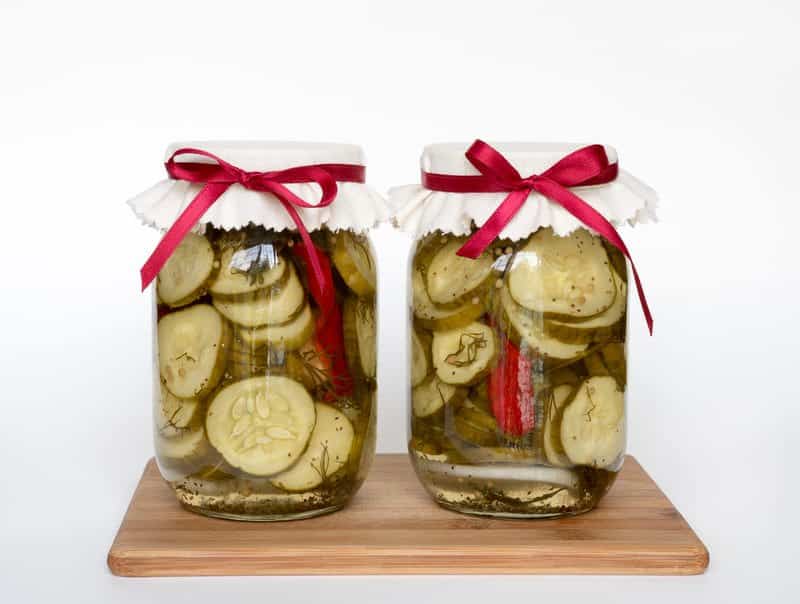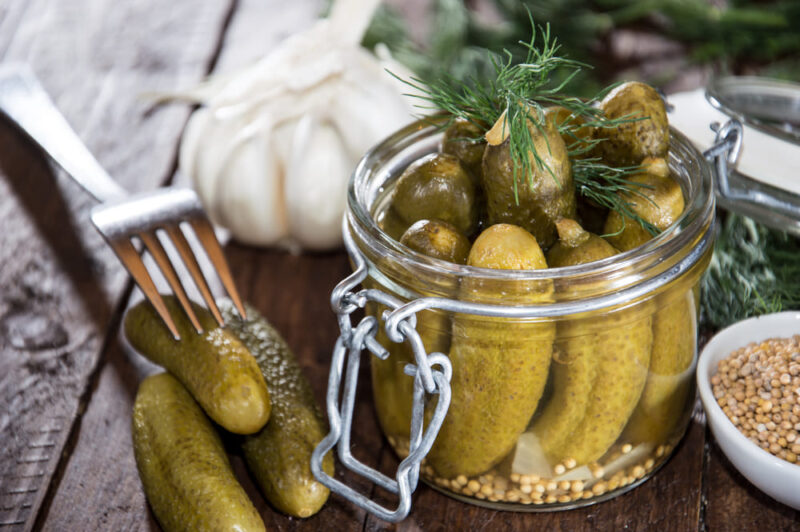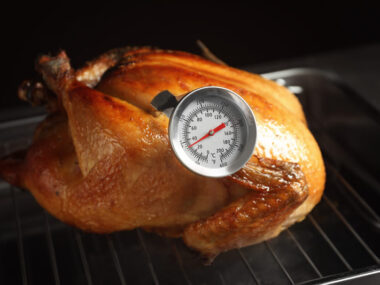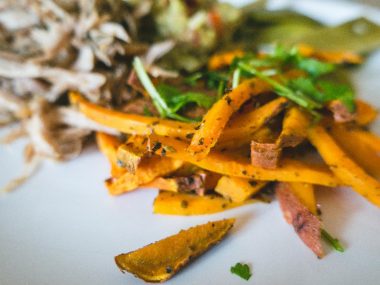Dill pickles are something nobody hates. You can snack on them as it is out of the refrigerator or put them in your burgers and sandwiches.
However, have you ever wondered why there different kinds of dill pickles including kosher dill pickles and polish dill pickle. What is the difference between the two?
You cannot find a difference between the two by just looking at them. The key difference is that kosher dill pickle contains garlic whereas polish dill pickle has peppery spices. You will only know it once you taste it.
If you are interested in knowing more about it, continue reading as we dive deep into the topic. We have tried to distinguish between the two and answered some common questions!
Dill Pickles
Dill pickles are the most famous cucumber pickles today. They are seasoned with the dill herb by adding fresh dill herb to the vinegar or salt brine along with other spices and cucumbers. Some of these pickles also use dill seeds or dill oil to boost the flavor of the pickle.
There are two types of dill pickles available in the market:
Kosher Dill Pickles
The derivation of the term kosher comes from the Jewish practice of making food. Kosher food strictly adheres to the kosher dietary laws.
Nowadays, kosher dill pickles refer to the pickles that have garlic. Some kosher dill pickles could also follow the dietary laws.
Currently, there are two types of Kosher Dill Pickles including full sours and half sours.
Full sours are the ones that go through a full fermentation process for 5-6 weeks. They attain a rich olive green color due to the same.
On the contrary, half sours are often removed midway in a fermentation process. It is why they have a very fresh and mild flavor. Their color remains bright green as they do not get fermented fully.

Homemade Kosher Dill Pickles Recipe
- Take cucumbers and cut them in halves.
- On a stove, heat a pan and add 4-5 garlic cloves, salt, vinegar, and a few cups of water.
- Boil it for one minute and then remove the garlic from the mix.
- Add the garlic to a jar. Then, add cucumbers.
- Finally, add 2 dill herbs and black pepper into the jar and pour the vinegar mix into the jar as well.
- Wipe the jar and remove excess bubbles. Cover the jar lid tightly and let it cool. Your kosher pickle is ready to use!
Polish Dill Pickles
Just like the Kosher dill pickles, polish dill pickles were also made in a kosher manner in the late 1900s. These pickle makers were originally from Poland, thus the name Polish Dill pickles.
They too have a green olive color but most importantly, the key thing that separates them from kosher pickles is that they do not contain garlic. Instead, the flavor of these pickles is spicy and comes from mustard seeds, black pepper, and red pepper.
What Is The Difference Between Polish Dill Pickles And Regular Dill Pickles?
Just like kosher dill pickles, regular dill pickles do not have many spices. On the contrary, Polish dill pickles are rich in spices.
They have a strong zesty flavor of pepper, mustard seeds, coriander, peppercorns, and others. In some polish pickle recipes, people also add garlic to boost the flavor.
What Makes A Polish Dill Pickle?
Polish dill pickles are made from spices, cucumber, salt, and water. You can also make polish dill pickles at home by following this easy-to-make recipe.
Homemade Polish Dill Pickles Recipe
- In a jar, add mustard seeds and dill herb.
- Place around 8-10 cucumbers in the jar such that they get covered with brine.
- Now, take a bowl with water and add salt to it.
- Add this saltwater to the jar such that there is a 1/4th inch gap between the lid and the brine.
- Close the jar loosely and keep it in a cool and dark place. This will help the carbon dioxide in the jar to escape when fermentation takes place.
- Fermentation will take around five to six weeks. Once the fermentation is complete, close the lid tightly to prevent spoilage.
Kosher Dill Pickle Vs Polish Dill Pickle: Comparison Chart
Finally, to summarize the difference between a kosher dill and a polish dill pickle; here is a table you can look at:
| Characteristics | Kosher Dill Pickle | Polish Dill Pickle |
| Origin | Kosher practices from Jewish | Kosher practice in Poland |
| Ingredients | Contains garlic but does not have spices. | Can contain garlic, but mainly has spices such as pepper and mustard seeds |
| Type Of Dill | Kosher Dill | Fresh Dill |
| Taste | Sweet and onion-like | Peppery and spicy |
Do Pickles Have To Be Refrigerated?
If you are using homemade kosher or polish dill pickles, you should keep them in a fridge. You can use the same jar for storing them in which you initially added them for fermentation or you can transfer the contents to a completely new jar.
However, if you are using store-bought dill pickles, you must check if they are pasteurized or not. Pasteurized pickles can stay in the kitchen pantry or shelves away from sunlight because pasteurization increases the shelf life of pickles.
If you are using unpasteurized pickles, make sure you keep them refrigerated at all times to increase their storability.
If you are using a barrel for dill pickles, they do not need refrigeration in most cases. The fermentation never stops in them as they have more good bacteria in them. However, they also have a much shorter shelf life than pickles in a jar.
How To Tell If Dill Pickles Went Bad?
Even after taking all the necessary precautions, there can be cases when the pickles can go bad. So, how can you check if they went bad? Here are 6 signs to tell that you should not eat them:
1. Brine is Cloudy
Generally, this isn’t the case with saltwater brine as mentioned in our recipes.
However, if you are using store-bought kosher or Polish dill pickles that usually have vinegar to increase the shelf life, cloudy brine is an indication of contamination.
Also, your dill pickles have spoiled if you see overclouded brine before your pickle has fermented completely.
2. Rancid Smell
If you open your pickle jar and there is an unpleasant smell coming out of it, do not try to taste it. This is a clear sign that some harmful bacteria have entered the jar. Rancid dill pickles can do more harm than good to your body.
3. Bubbles in the Jar
If there is excess air in the jar, it can hamper the jar’s ability to drive it out to the top and this could lead to discoloration and a bad smell.
If no one has shaken the dill pickle yet when you open it, you see the bubbles. It means that the pickles might have spoiled.
4. Lid is Bulging
Stale dill pickles have way too much acid. This acid build-up creates a lot of pressure in the jar.
Since the jar cannot handle this pressure, it causes the lids to bulge. Soon, the jar might even break. If you notice any such signs, throw the pickle right away.
5. Bitter Taste
Pickles can taste bitter if you have not used the right quantity of vinegar in them or the vinegar is too acidic. Also, in the case of polish pickles, using too many spices can lead to a bitter taste. Although this does not harm your health, dill pickles would not taste nice.
6. Mold
If pickles are sticking out of the brine, you might see mold on them. They don’t need to go bad. Sometimes, this happens because pickles react with the air.
However, if this is combined with the above-mentioned signs, this is an indication that they have spoiled or contaminated, so they are unfit for consumption.


